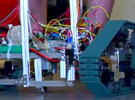SMU’s first-year engineering students try robo-collaboration
Engineering students build robots to collect and remediate water samples for U.N. project.

By Kim Cobb
SMU News
DALLAS (SMU) – The Innovation Gym in SMU’s Lyle School of Engineering was buzzing and clanking on a recent morning as first-year students in an interdisciplinary design course tested robots they designed and built to a specific task. The challenge? To replicate the work of collecting and remediating water samples that Lyle School faculty and students have been doing in U.N. refugee camps in Africa and Bangladesh.
“When it actually works, it’s amazing!” crowed first-year Lyle student Jordan Kayse. Andrew Quicksall, the Lyle School’s J. Lindsay Embrey Assistant Professor, explained that this kind of experience is as much about teaching soft skills like cooperation and communication across disciplines and genders as it is about engineering.
Teaching the course is a team experience, too – tapping the skills of Quicksall, an environmental engineer; Mark Fontenot, a Lyle computer science lecturer; Kate Canales, director of design and innovation programs at Lyle; Adam Cohen, visiting assistant clinical professor in mechanical engineering, Joseph Cleveland, visiting lecturer in electrical engineering; and Preston Yarborough, project manager for the Center for Creative Leadership (CCL), a global nonprofit education and research organization that is partnering with the Lyle School’s Hart Center for Engineering Leadership.
A strong work dynamic emerged when the class started meeting in August. This prompted a team of CCL researchers to inquire whether the Lyle School might be interested in collaborating on a research initiative based on techniques the students were using. A CCL research team, sponsored through the organization’s Alfred J. Marrow Fund, will travel to SMU to study the class when it meets with the next group of students in the spring. What the team gleans from observing the SMU course could foster new tools and processes that can benefit organizations and educational institutions around the country.
One of CCL’s goals in partnering with Lyle’s Hart Center is to prepare students to work in volatile and fast-changing work environments. “Success in today’s workplace requires an astute understanding of the informal networks that really drive how organizations work,” Yarborough said.
The Introduction to Engineering Design class is the first of its kind at SMU – a “Ways of Knowing” course designed to cut across disciplines to explore how natural scientists, social scientists, humanists, artists, engineers and professionals in business and education go about addressing important issues. Under the new University Curriculum, all undergraduates who enter SMU in the 2012-1013 academic year and thereafter will be required to complete one “Ways of Knowing” class taught collaboratively by faculty members from different disciplines and organized around a major topic or question.
###
09780-web-12/11/12-kc